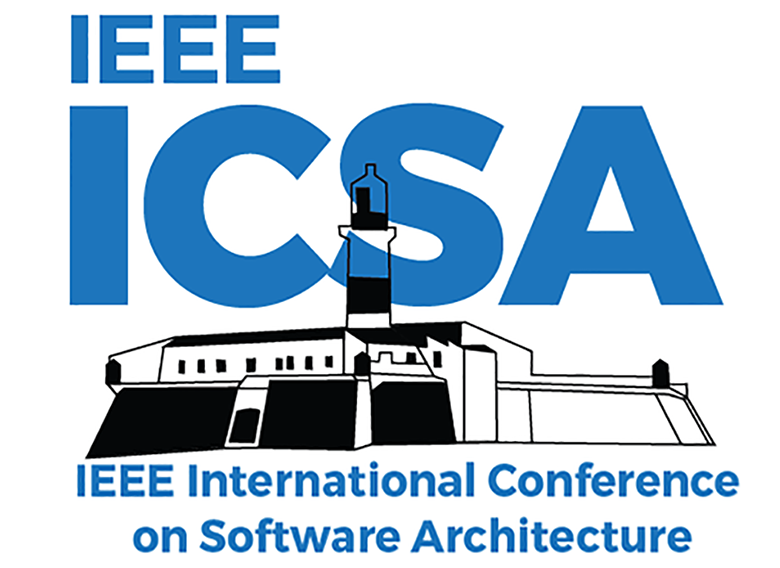Download the ICSA New and Emerging Ideas (NEMI) track CFP here.
The goal of the New and Emerging Ideas (NEMI) track at ICSA 2020 is to encourage the software architecture community to propose new software architecture research visions and ideas, which can potentially challenge the status quo of the software architecture discipline (research and practice) and point to new directions and opportunities.
Important Dates (AoE)
- Abstracts (mandatory) due: Jan 08, 2020
- Papers due: Jan 13, 2020
- Paper notification:
Feb 01, 2020Feb 03, 2020 - Camera-ready due: Feb 10, 2020
Types of submissions
The ICSA 2020 NEMI track seeks the following types of contributions:
New Ideas (4 pages):
- Visions or new directions supported by a strong and well-motivated scientific foundation or practical application;
- Arguments or results that challenge established results or beliefs, giving evidence that calls for fundamentally new directions, opening up new research avenues or software architecture practices;
- Radically new approaches, techniques, or theories that can bring new results to software architecture research or practice.
Emerging Results (4 pages):
- Not yet fully mature research results, that may lack full validation but that still can stimulate discussions; papers should trigger discussion and raise awareness and reflection on specific topics, in research and/or industrial practice.
NEMI papers must clearly motivate and illustrate a rationale for changing current practice and/or research in software architecture. Evaluation results are not required for NEMI papers (but if such results exist, then they may be presented, if only to give the reviewers a feel about the evaluation plan). Strong argumentation and reasoning is expected to inspire the readers.
Scope
NEMI provides a forum for innovative, thought-provoking insights in software architecture in order to accelerate the exposure of the community to early and on-going yet promising and potentially inspiring innovations in industry and academia.
NEMI papers are not second-class ICSA research track papers. NEMI is a forum for first-class contributions that provide novel, soundly motivated directions and emerging results in research and practice.
In principle, the track addresses the same topics of interest as those of the technical paper track. However, NEMI authors are encouraged to combine these topics in new ways, to establish connections to other fields outside of classical software architecture, push the boundaries of software architecture to new avenues, as well as to argue for the importance of software architecture research and practice in areas not explicitly listed.
Out of scope
A NEMI submission should not be just incremental results on existing research, nor disguised advertisements for previously published results, products, tools or methods, or experience reports. ICSA 2020 has several tracks and workshops where such works can be submitted.
Evaluation
All submissions will be evaluated in terms of the following criteria:
- Value: the problem is worth exploring, ideally real world use-inspired.
- Impact: the potential for disruption of current practice and/or research;
- Originality: new insights or ideas/visions;
- Rationale: soundness of the justification, reasoning and argumentation;
- Evaluation: appropriate consideration of relevant literature and/or research evaluation to demonstrate originality, arguments and limitations;
- Quality: overall manuscript quality.
Formatting and Submission Instructions
All NEMI submissions must conform to the Author Instructions, and must not exceed four pages, including all text, references, appendices, and figures. No double-blind, but single-blind review will apply to NEMI papers. All papers are to be submitted electronically via the NEMI EasyChair submission system, by the submission deadline. Submissions must not have been published elsewhere and must not be under review or submitted for review elsewhere while under consideration for ICSA 2020 NEMI track.
Note in addition to an oral plenary presentation at the conference, authors of accepted papers may also bring a poster describing their work to further showcase their work to a broader ICSA audience.
Publication and attendance
All accepted contributions will be published in ICSA 2020 Companion proceedings, and appear in IEEE Xplore Digital Library. At least one author of an accepted contribution is required to register and present the work at the conference.
Organization
For more information please contact the NEMI Track chairs through icsa2020nemi@easychair.org:
- Thais Batista, Federal University of Rio Grande do Norte (UFRN), Brazil.
- Nelly Bencomo, Aston University, UK (nelly AT acm.org).
Program Committee
- Romina Spalazzese, Malmö University, Sweden
- Nour Ali, Brunel University, UK
- Matthias Galster, University of Canterbury, New Zealand
- Carlos E. Cuesta, Rey Juan Carlos University, Spain
- Flavia Delicato, Fluminense Federal University (UFF), Brazil
- Jair Leite, Federal University of Rio Grande do Norte (UFRN), Brazil
- Elisa Yumi Nakagawa, University of São Paulo, Brazil
- Eltjo Poort, CGI, Netherlands
- Paulo Pires, Fluminense Federal University (UFF), Brazil
- Martin Becker, Fraunhofer, Germany
- Gabriel A. Moreno, Software Engineering Institute - Carnegie Mellon University, USA
- Javier Camara-Moreno, University of York, UK
- Flavio Oquendo, Univ. de Bretagne-Sud, France
